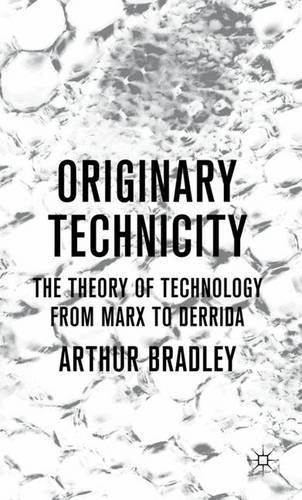Overview
This book is the first critical genealogy of Jacques Derrida's philosophy of technology. It traces the evolution of what Derrida calls 'originary technicity' via an appraisal of his own philosophy of technology together with that of key interlocutors including Marx, Freud, Lacan, Heidegger and Bernard Stiegler.
Full Product Details
Author: A. Bradley
Publisher: Palgrave Macmillan
Imprint: Palgrave Macmillan
Dimensions:
Width: 15.20cm
, Height: 1.40cm
, Length: 22.90cm
Weight: 0.467kg
ISBN: 9780230576926
ISBN 10: 0230576923
Pages: 202
Publication Date: 27 May 2011
Audience:
College/higher education
,
Postgraduate, Research & Scholarly
Format: Hardback
Publisher's Status: Active
Availability: In Print

This item will be ordered in for you from one of our suppliers. Upon receipt, we will promptly dispatch it out to you. For in store availability, please contact us.
Reviews
'This brilliant book is at the frontier of new thinking about 'originary technicity.' To say that technology was there from the beginning as an originating force implies that all organic life, including human life, is machinal through and through. The automatic working of genetic programming in any form of 'life' would be an example of this. Plants, animals, and human beings are chemical machines. Though a putting in question of Derrida's thinking about technics holds center stage, many other recent explorers of these new ideas (Marx, Freud, Lacan, Heidegger, Stiegler, Hayles, Hansen) are also shown with admirable clarity, learning, and insight still to make a residual anthropocentric appeal to the presumably non-machinic thinking subject. Essential reading for technophobes and technophiliacs alike.' - J. Hillis Miller, Distinguished Research Professor of Comparative Literature and English, University of California at Irvine, USA
'This brilliant book is at the frontier of new thinking about originary technicity. To say that technology was there from the beginning as an originating force implies that all organic life, including human life, is machinal through and through. The automatic working of genetic programming in any form of life would be an example of this. Plants, animals, and human beings are chemical machines. Though a putting in question of Derrida's thinking about technics holds center stage, many other recent explorers of these new ideas (Marx, Freud, Lacan, Heidegger, Stiegler, Hayles, Hansen) are also shown with admirable clarity, learning, and insight still to make a residual anthropocentric appeal to the presumably non-machinic thinking subject. Essential reading for technophobes and technophiliacs alike.' - J. Hillis Miller, Distinguished Research Professor of Comparative Literature and English, University of California at Irvine, USA
Author Information
ARTHUR BRADLEY is Senior Lecturer in Contemporary Literature and Critical Theory at Lancaster University, UK. He is the author of Negative Theology and Modern French Philosophy; Derrida's Of Grammatology: A Philosophical Guide and (with Andrew Tate) The New Atheist Novel: Fiction, Philosophy and Polemic after 9/11.




